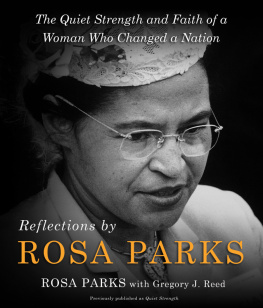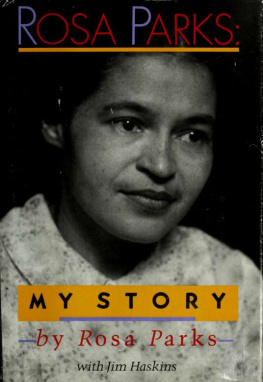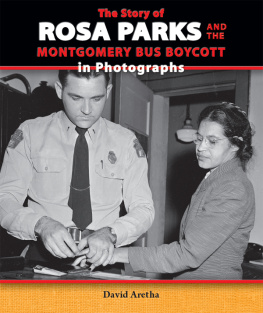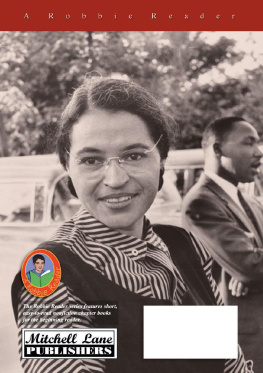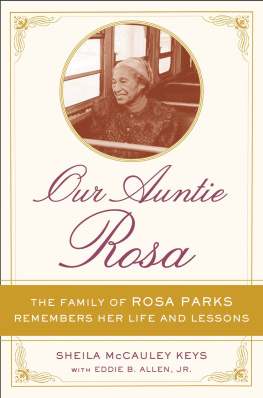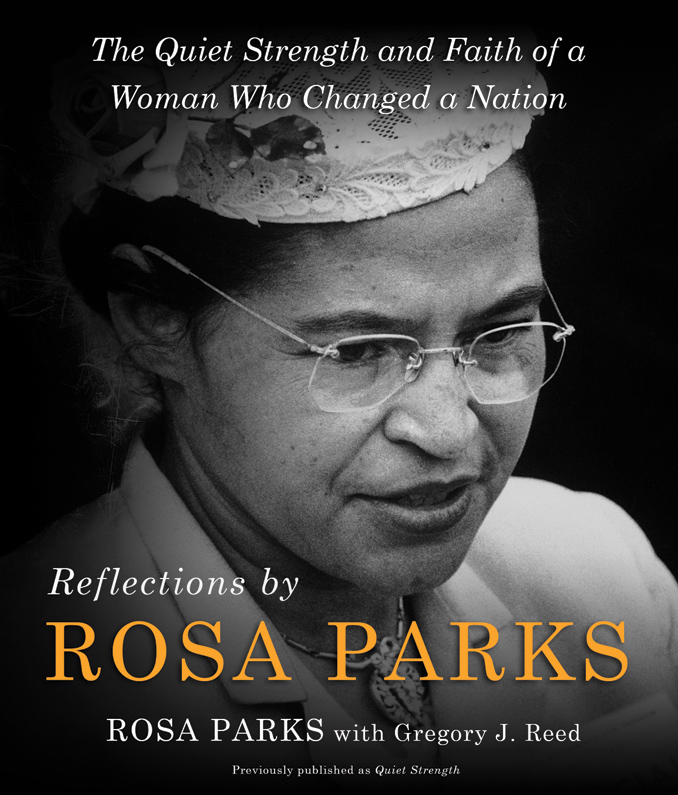ZONDERVAN
Reflections by Rosa Parks
Copyright 1994 by Rosa L. Parks
Previously published as Quiet Strength
Requests for information should be addressed to:
Zondervan, 3900 Sparks Dr. SE, Grand Rapids, Michigan 49546
ISBN 978-0-310-35156-6 (hardcover)
ISBN 978-0-310-35310-2 (audio)
ISBN 978-0-310-35157-3 (ebook)
Epub Edition November 2017 ISBN 9780310351573
Epilogue from Resurrection of Rosa Parks: The Branding of Icon, Spirit and Soul by Gregory J. Reed. Copyright 2006 by Gregory J. Reed. Reprinted by permission of Keeper of the Word Foundation.
Library of Congress Cataloging-in-Publication Data
Parks, Rosa, 19132005
Quiet strength: the faith, the hope, and the heart of a woman who changed a nation / Rosa Parks with Gregory J. Reed.
p. cm.
Includes bibliographical references.
ISBN: 0-310-50150-4 (hardcover: alk. paper)
1. Parks, Rosa, 1913. 2. Afro-AmericansAlabamaMontgomeryBiography. 3. Civil rights workersAlabamaMontgomeryBiography. 4. Segregation in transportationAlabamaMontgomeryHistory20th century. I. Reed, Gregory J. II. Title.
F334.M79P37 1994
323.092dc20 9446141
[B] CIP
Scripture quotations, unless otherwise noted, are taken from the King James Version. Public domain.
All Scripture quotations marked NIV are taken from The Holy Bible, New International Version, NIV. Copyright 1973, 1978, 1984, 2011 by Biblica, Inc. Used by permission of Zondervan. All rights reserved worldwide. www.Zondervan.com. The NIV and New International Version are trademarks registered in the United States Patent and Trademark Office by Biblica, Inc.
Any Internet addresses (websites, blogs, etc.) and telephone numbers in this book are offered as a resource. They are not intended in any way to be or imply an endorsement by Zondervan, nor does Zondervan vouch for the content of these sites and numbers for the life of this book.
All rights reserved. No part of this publication may be reproduced, stored in a retrieval system, or transmitted in any form or by any meanselectronic, mechanical, photocopy, recording, or any otherexcept for brief quotations in printed reviews, without prior permission of the publisher.
Cover design: Curt Diepenhorst
Cover photo: Paul Schutzer/Getty Images
Interior design: Denise Froehlich
Edited by Verne Becker and Elaine Steele
First printing November 2017 / Printed in the United States of America
In memory of my great-grandmother Jane and great-grandpa James Percival, grandparents Rose and John Edwards, mother Leona Edwards McCauley, brother Sylvester McCauley, husband Raymond Parks
ROSA L. PARKS
With love to my daughters Arian and Ashley, and sister Sharon Lawson, and brother Narraine Reed for their inspiration and support. To my mother Bertha and my adopted mothers Maureen Pearson and Alma Whitley for the love and guidance they have given me throughout my life. I thank them for being excellent role models. And finally, to my grandmothers Zemine Wourman
GREGORY J. REED
Contents
Guide
T o Elaine Steele, dearest friend, and Gregory J. Reed, who have been a source of strength and support in my life. I am grateful for their many contributions, including the technical editing of this book by Elaine Steele.
ROSA L. PARKS
The coauthor gratefully acknowledges Elaine Steele, the cofounder of the Rosa and Raymond Parks Institute for Self-Development. Her support and guidance have helped make it possible to expand the legacy of Rosa Parks so that others can learn from her life and words.
A special thanks to Stan Gundry of Zondervan, and Kelli Monteiro, the primary researcher, analyzer, and organizer, who made striking comments that helped establish the infrastructure for the text of this book. To Dr. Otis Stanley, a key contributor, for his patience, ideas, and suggestions, which were invaluable in improving the Quiet Strength book. Also, to my dear friends, protectors of the Parks Legacy: Dr. C. Eric Lincoln, Richard Manson, Stephanie L. Hammonds, Maurita Coley, Johnnie L. Cochran, Pres. Barrack Obama, Nelson Mandela, Alex Haley, Joe Madison, Muhammad Ali, Deepak Chopra, Coretta Scott King, Oprah Winfrey, Virginia Durr, Johnnie Carr, Dr. Charles Wright, Antoinette Wright, Malik Shabazz, Dr. Glenda Curry, Hon. John Conyers, Julia Carson, JoAnn Watson, Brenda Jones, Don Davis, Beryl Anderson, Carl R. Edwards Esq., ONeil and Linda Swanson, Dr. Linda Lott, Khalid el-Hakim, Dr. Robert Green, Coleman A. Young, Robert Millender, Jack Boland, Douglas Brinkley, William Harris, William C. and Betty Brooks, Derrick A. Humphries, David Ashenfelder, Tavis Smiley, Cornel West, and Mildred Gaddis.
And thanks to supporters of the Legacy: Dr. Curtis Ivery, Munson Steed, Hon. Christopher Brown, Kenneth Watson, Damon Flournoy, Paul Katz, Rod Spencer, Jeff Wardford, Robert Wourman, Blane Hailemichael, Jayron Jenkins, Herb Boyd, Nikki Howard Combs, Karen Lloyd, Marie Christmon, Cherron Jones, Kwame Kenyatta, Marcel Todd, Dr. James Blessman, Perri Keys, Steven Reifman Esq., BESLA Founders, Morris Jenkins, Keeper of the Word Foundation, and Million Man March... and countless others, for their courage and bravery.
GREGORY J. REED
R osa Louise Parks is nationally recognized as the mother of the modern-day civil rights movement in America. By refusing to surrender her seat to a white male passenger on a Montgomery, Alabama, bus on December 1, 1955, she set in motion a chain of events that were felt throughout the United States. Her quiet, courageous act changed America and redirected the course of history.
She was born Rosa Louise McCauley on February 4, 1913, in Tuskegee, Alabama. She was the first child of James and Leona (Edwards) McCauley. Several years later her family moved to Pine Level, Alabama, where she was educated in a rural schoolhouse.
When Rosa completed her education in Pine Level at age eleven, her mother enrolled her in Montgomery Industrial School for Girls (also known as Miss Whites School for Girls), a private institution. Several years later she went on to Alabama State Teachers College for Negroes for tenth and eleventh grade. She was unable to graduate with her class, however, because of the illness and subsequent death of her grandmother, Rose Edwards. As Rosa prepared to return to school, her mother also became ill, so she remained home to care for her mother while her younger brother, Sylvester, worked to help support the family.
Rosa married Raymond Parks on December 18, 1932. Raymond was born in Wedowee, Alabama, in 1903. He received little formal education because of racial segregation; but with the encouragement of his mother, Geri Parks, Raymond educated himself. As an adult, his thorough knowledge of domestic affairs and current events led most people to believe he had gone to college. He supported Rosas desire to complete her formal education, and in 1934 she received her high school diploma.
Raymond was an early activist in the effort to free the Scottsboro Boys, a highly-publicized case in the 1930s. Together Raymond and Rosa worked in the National Association for the Advancement of Colored People (NAACP). He was an active member, and she served as secretary and, later, as youth leader of the local Montgomery branch. At the time of her arrest, she was preparing for a major youth conference.
Four days after her arrest, the black people of Montgomery and sympathizers of other races organized and promoted a boycott of the city bus line. For 381 days, blacks either walked or arranged their own rides throughout the city rather than taking the bus. Reverend Martin Luther King Jr., the appointed spokesperson for the boycott, emphasized the importance of nonviolence by all participants. Following the lead of Montgomery, other protests took shape throughout the countrysit-ins, eat-ins, swim-ins, and more. Thousands of courageous people joined together to demand equal rights for all. The bus boycott ended on December 21, 1956, after the U.S. Supreme Court declared bus segregation unconstitutional.

